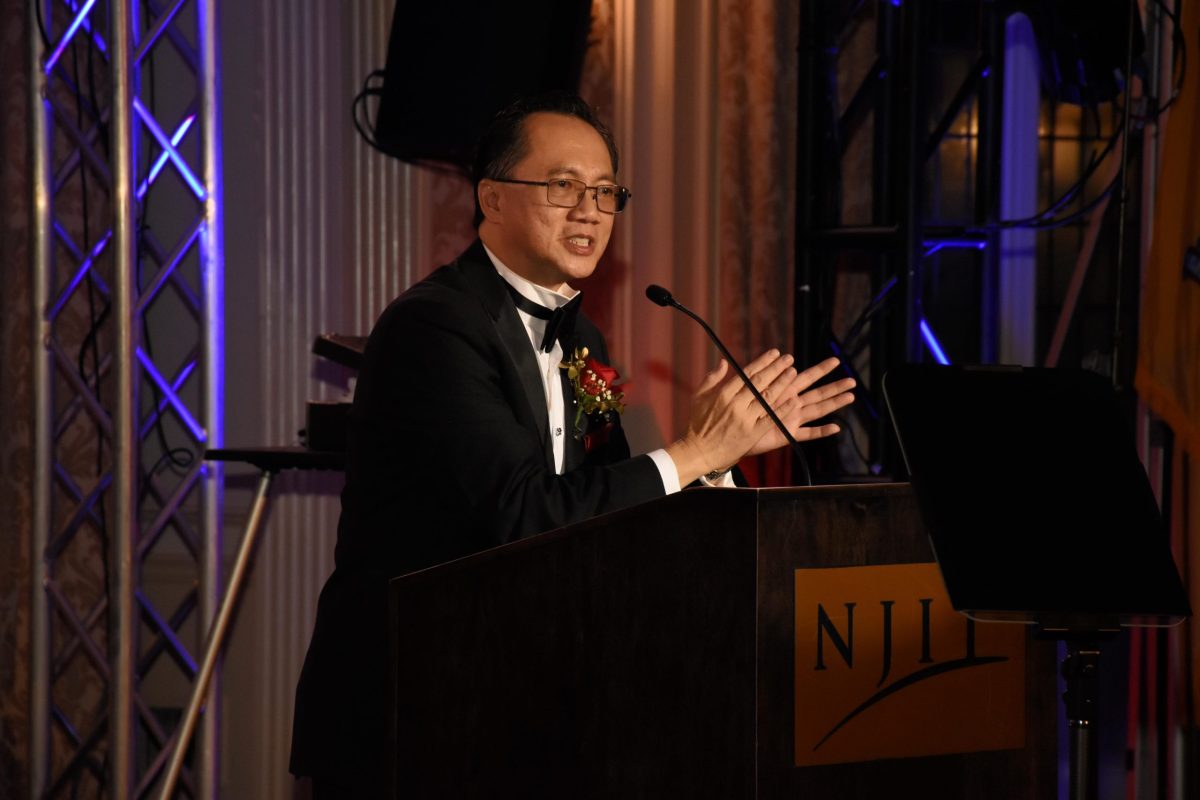(Photo from Cathy Hansen)
December marks NJIT President Dr. Teik C. Lim’s sixth month in office, and he took some time to detail his experience throughout his first complete semester. Even before Lim officially started in the role, he made many visits to campus starting in March, which he describes as the runway to officially lifting off four months later.
Since July 1, he has engaged with the campus community almost daily, attending events often. “These events actually helped me understand who NJIT is, our aspirations, and where we want to go from here,” Lim said. “And I learned so much from talking to so many people like our students, faculty, staff, the community, industry supporters, and legislators or elected officials who have interest in NJIT.”
He mentioned that his wife, NJIT First Lady Gina Lim, is one of the university’s greatest ambassadors. “She’s the heart of NJIT all the time,” he added. At this point, the two of them are fully settled down and feel very comfortable at the institution.
Lim explained that one of his proudest projects so far is getting to know the NJIT community. “It may not sound like a project, but it is,” he said. “It takes a lot of effort to get to know people.” In addition to knowing them, he has tried to make this university a much more inclusive space.
“I want to make this campus as welcoming as possible for everybody who wants to come here and be successful. So for that, we just hired an inaugural Chief Diversity Officer for this institution,” he said. “We had previous failed searches, but when I came here, because of my experience of being able to hire a chief diversity officer in my former positions, I was able to hire Dr. David Jones.”
There have also been several searches for new positions launched recently, including Chief Digital Officer and Vice Provost for Enrollment Management.
Even with all this success so far, he said that the hardship in any new place is always to learn about what makes the place tick. “Working with elected officials here was new to me because I’ve not lived in New Jersey before,” he added. “When I became president at the University of Texas at Arlington, I was there for a while already. I knew the background and atmosphere. Here, I’m basically coming in new. But it’s good because I’m coming with a clean slate.”
In order to ensure the smoothest transition from previous NJIT President Dr. Joel Bloom, Lim is still in contact with him regularly. When Lim was first named as the president-elect, they had agreed on two things. The first was having some continuity of operations because academic institutions thrive on stability. The second was the phrase “what got us here won’t get us there,” meaning that there will still be gradual change.
“We have to always continue to reimagine, innovate, and be very entrepreneurial,” Lim said. “In fact, I can tell you that this place is the most innovative and entrepreneurial place I’ve seen. Why? It’s because of the diversity that we have on this campus.”
One example of gradual change is the strategic plan. “Our plan was created before the pandemic, which had a huge impact on how we learn, do research, conduct ourselves, and engage with each other,” he said. “We’re in a digital world. Because of the pandemic, we got pushed out to the future into an era that is much more heavily reliant on digital technology.”
Lim and the rest of the committee are in the process of evolving the strategic plan based on how it has been impacted by factors such as the pandemic. “I think this project will be a campus-wide initiative that would do justice to this institution in terms of being a guiding light for the next five to 10 years,” he said.
“Students here will be educated of the mind, the heart, and the soul, meaning that we’re providing a very holistic education. Every student here should learn power skills, the ability to communicate, engage others, have a conversation and discussion, express their ideas, and most importantly, have empathy,” he stated.
“Most of our students major in STEM, science, technology, engineering, and mathematics; even our non-STEM programs are STEM-slanted. For example, in business we have FinTech, or financial technology. What do STEM-oriented people do? Well, we design systems, we create products, we develop machines. For whom? Humanity. So, if we do this for humanity, we should understand something about humanity,” he continued. “When you have empathy, you understand what humanity is, and then we can do our job better. We can design the next best system for humanity.”

































